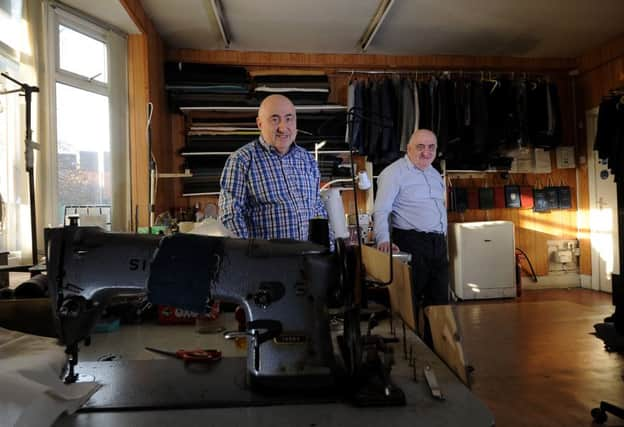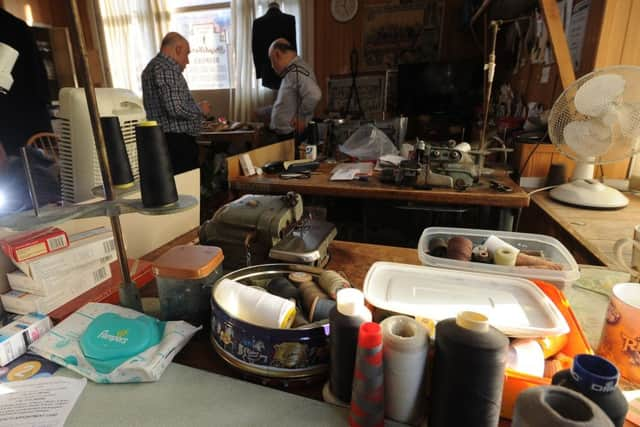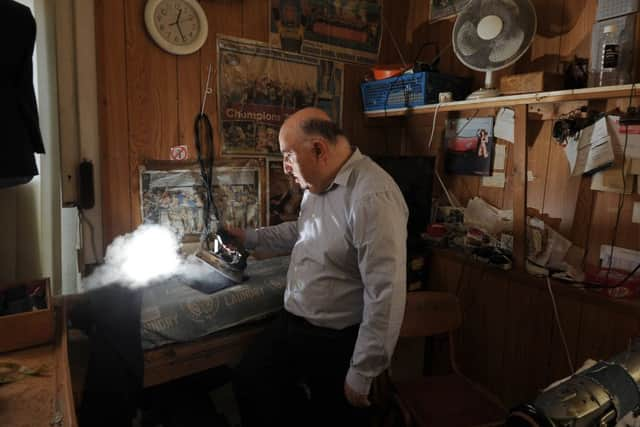Meet the traditional Jewish tailors still going in Leeds


It’s astonishing to think that at one time 60 per cent of suits sold in Britain were made in Leeds.
The city wasn’t just at the heart of the linen trade in this country, its name was known around the world as a byword for quality tailoring.
Advertisement
Hide AdAdvertisement
Hide AdThough the manufacturing heritage of West Yorkshire stretches back to the 18th century, when its legion of woollen and textile mills ruled supreme, it was during the first half of the last century that Leeds’s sartorial reputation really came to the fore.


It was a reputation built around Jewish migrants from Russia and Eastern Europe who came to Yorkshire at the turn of the 20th century to escape persecution, pogroms and poverty.
Many ended up settling in Leeds, rather than continuing on to New York, enticed to stay by the city’s burgeoning tailoring industry. Among those to make new lives in the city was Polish-born Michael Marks, who went on to become the co-founder of Marks & Spencer.
So, too, did Montague Burton – a migrant from Lithuania. He set up his first tailoring factory in 1909 and went on to create one of the biggest high street chains in Europe.
Advertisement
Hide AdAdvertisement
Hide AdBy the late 1930s his clothing was estimated to have been worn by as many as one-fifth of the male population of Britain. It was during this decade that another Jewish migrant, Jack Brightbart, started a family clothing business.


Today, his sons Clive and Mervyn run MC and J Brightbart Tailors, the business he started, from their office and workshop in the centre of Leeds.
The twins are now among the last remaining Jewish tailors in the city – a far cry from its tailoring heyday which is still well within living memory.
Jack Brightbart set up his business in 1936. “He started it on his own working from home,” says Clive. “He made suits for people he knew and he would sometimes work till 12 o’clock at night when he first started.”
Advertisement
Hide AdAdvertisement
Hide AdFrom these humble beginnings the business quickly grew and in the 1940s he and his brother, Julius, set up a factory in the city centre. “My father had a factory on Dock Street near the Tetley’s building and at one time he employed between 200 and 300 people, it was a big business and they made jackets and trousers for places like Hepworth’s and Dunnes.”
Clive and Mervyn joined their father’s business when they left school, working at his shop on Harehills Road. Clive learned from his father and has been part of the family business his whole working life.
“I was 16 when I started,” he says. “There were hundreds of factories and shops and men’s outfitters doing made to measure, it was nothing like it is now. People used to wear suits but in offices now you don’t have to wear them,” he says, sounding a little rueful.
He and his brother have been based at their premises tucked away off New Briggate for the past 21 years. And walking up the staircase into their snug office and workroom is a bit like stepping back in time.
Advertisement
Hide AdAdvertisement
Hide AdA rack of suits and jackets runs along one wall, next to piles of carefully folded cloth. There’s more than just a whiff of nostalgia here, but there’s also something reassuringly pleasing about it. Some of the machines look vintage, or antiquated if you weren’t feeling so charitable. But they do the job and – like the suits they help produce – they’re made to last. “Some of these sewing machines are probably older than me,” Clive says, with a chuckle. “The modern ones are plastic and they break down all the time, but these are good machines.”
These days they make six or seven suits in a good week and Clive is proud of the fact they get their cloth from Leeds and Huddersfield.
So what then makes a good suit, and why should people consider paying to get one made? “First of all it lasts a lot longer, secondly you can pick your own cloth and you can choose a different colour from what you find in shops on the high street, and thirdly they’re better made,” he says.
“I can tell the difference between a good suit and a bad one. You look at how the pockets and sleeves are made, how they make the lining and the vents. You see people on TV sometimes and think ‘I don’t know where you got that from.’”
Advertisement
Hide AdAdvertisement
Hide AdMany of their customers are long-standing ones, which is testament to the quality of the work done by the brothers and their small team. “We get a lot of barristers, solicitors and accountants who still want suits but a lot of people only wear them for special occasions now like weddings and christenings. But I think they are coming back a little bit.”
The trouble is there isn’t the same demand for bespoke suits there once was and tailors like them have become something of a dying breed. “My kids don’t want to do it,” he says. But then he wouldn’t advise anyone to go into the business. “Not if you want to be rich. My father did well but that was 40 years ago, you can’t do it nowadays. You can’t compete with cheap imports from places like China or Turkey.”
As well as producing suits, the brothers, who recently featured in Simon Glass’s BBC TV documentary A Very British History – The Jews of Leeds, also do alterations – another skill that’s becoming harder to find in our disposable-obsessed society.
“We’ve had some good times when business has done well but during that last recession we had to put our own money in just to keep going.”
Advertisement
Hide AdAdvertisement
Hide AdBut while fashions come and go, the skill involved in making a good suit hasn’t really changed, and while others called it a day, the Brightbart brothers have kept going.
“I wouldn’t do it if I didn’t enjoy it,” says Clive. “I never thought of doing anything else... It must be in our blood.”
www.mcandjbrightbart.co.uk